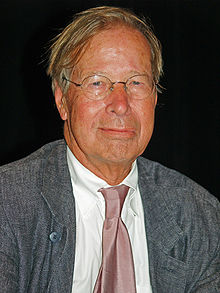
Back رونالد دوركين Arabic رونالد دوركين ARZ Роналд Дуоркин Bulgarian Ronald Dworkin Czech Ronald Dworkin Welsh Ronald Dworkin German Ronald Dworkin Spanish Ronald Dworkin Estonian Ronald Dworkin Basque رونالد دوورکین Persian
Ronald Dworkin | |
|---|---|
 Dworkin in 2008 | |
| Born | Ronald Myles Dworkin December 11, 1931 Providence, Rhode Island, U.S. |
| Died | February 14, 2013 (aged 81) London, England |
| Education | |
| Awards | Henry J. Friendly Medal (2005) Holberg International Memorial Prize (2007) Balzan Prize (2012) |
| Era | Contemporary philosophy |
| Region | Western philosophy |
| School | Analytic Legal interpretivism |
| Institutions | |
| Doctoral students | Jeremy Waldron |
Main interests | |
Notable ideas |
|
Ronald Myles Dworkin FBA QC (/ˈdwɔːrkɪn/; December 11, 1931 – February 14, 2013) was an American legal philosopher, jurist, and scholar of United States constitutional law.[3] At the time of his death, he was Frank Henry Sommer Professor of Law and Philosophy at New York University and Professor of Jurisprudence at University College London. Dworkin had taught previously at Yale Law School and the University of Oxford, where he was the Professor of Jurisprudence, successor to philosopher H. L. A. Hart.
An influential contributor to both philosophy of law and political philosophy, Dworkin received the 2007 Holberg International Memorial Prize in the Humanities for "his pioneering scholarly work" of "worldwide impact".[4] According to a survey in The Journal of Legal Studies, Dworkin was the second most-cited American legal scholar of the twentieth century.[5] After his death, Harvard legal scholar Cass Sunstein said Dworkin was "one of the most important legal philosophers of the last 100 years. He may well head the list."[6]
His theory of law as integrity as presented in his book Law's Empire, in which judges interpret the law in terms of consistent moral principles, especially justice and fairness, is among the most influential contemporary theories about the nature of law. Dworkin advocated a "moral reading" of the United States Constitution,[7] and an interpretivist approach to law and morality. He was a frequent commentator on contemporary political and legal issues, particularly those concerning the Supreme Court of the United States, often in the pages of The New York Review of Books.
- ^ Ofer Raban, "Dworkin's 'Best Light' Requirement and the Proper Methodology of Legal Theory", Oxford Journal of Legal Studies, 23(2) (Summer, 2003), pp. 243–264.
- ^ Dworkin, R., "Rights as Trumps," in: Waldron, J. (ed.), 1984, Theories of Rights, Oxford: Oxford University Press, pp. 153–67.
- ^ Khouryyesterday, Jack (February 15, 2013). "Ronald Dworkin dies at 81 – Haaretz – Israel News". Haaretz.com. Retrieved May 31, 2017.
- ^ "Ronald Dworkin". New York Review of Books. Nybooks.com. Accessed September 29, 2009.
- ^ Shapiro, Fred R. (2000). "The Most-Cited Legal Scholars". Journal of Legal Studies. 29 (1): 409–426. doi:10.1086/468080. S2CID 143676627.
- ^ "The Most Important Legal Philosopher of Our Time". Bloomberg. February 15, 2013. Retrieved May 31, 2017.
- ^ Freedom's Law: The Moral Reading of the American Constitution. Ronald Dworkin. Cambridge, Massachusetts: Harvard University Press. 1996. via Google Books.